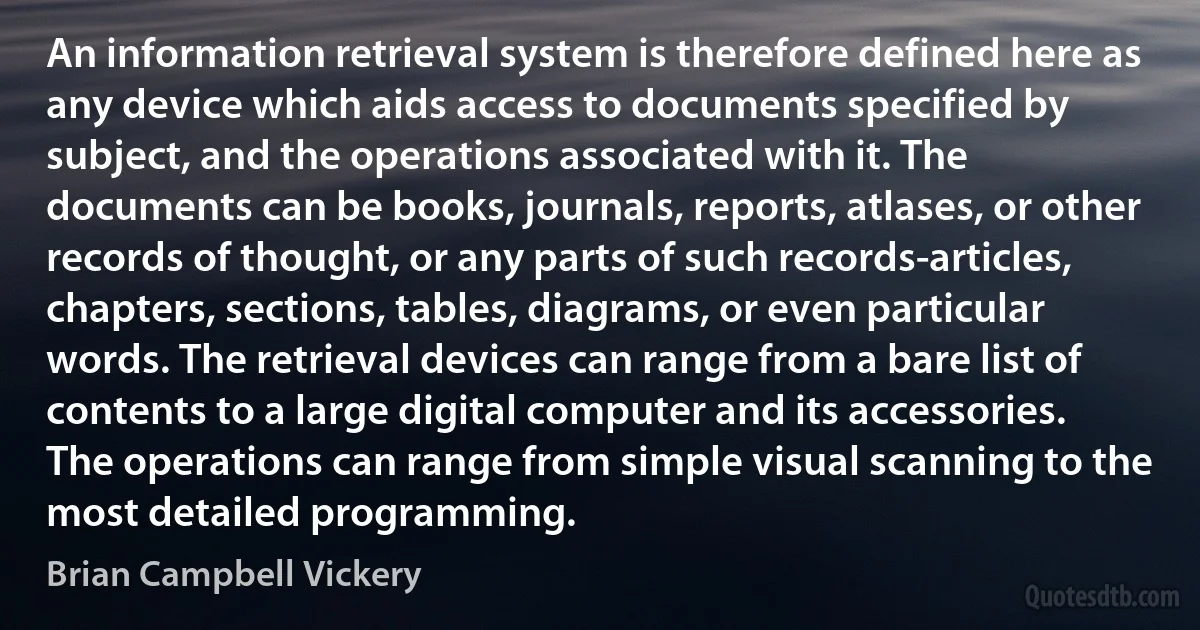Contents Quotes - page 5
We take for granted that we need to take showers, clean our house, and wash our clothes. Yet the mind and its thoughts need cleansing and ordering as much as our bodies. While few of us would consider eating dinner on yesterday's dirty dishes, we think nothing of tackling our problems with yesterdays cluttered minds.... The purpose to any meditation technique is to move beyond the normal contents of our consciousness, empty your mind of its habitual chatter, and concentrate your attention for the purpose of experiencing a higher state.

Anodea Judith
If you peruse the table of contents of a textbook on organizational theory or search the web for courses in organizational sociology, you cannot help but notice how many of the key contributors to the field spent time at Stanford between 1970 and 2000, as faculty members, post-docs, or graduate students... Of the five most influential macro-organizational paradigms in play today - institutional theory, network theory, organizational culture, population ecology, and resource dependence theory (in alphabetical order) – Stanford served as an important pillar, if not the entire foundation, for all but network theory. By the 1990s, it became an important site for network theory as well.

Frank Dobbin
It is moreover extremely indecent to spit, cough, and expectorate (as it were) in company, as some hearty fellows are apt to do: and more so, when you have blown your nose, to draw aside and examine the contents of your handkerchief; as if you expected pearls or rubies to distil from your brain.

Giovanni della Casa
Visitors from Bijapur could count on his hospitality and receive roti and sabji and sometimes stay overnight with us. One frequent visitor would have none of the roti and halva. She would break an egg, swallow the contents, and top it off with a glass of milk from one of grandmother's cows. That would be Indira Gandhi's breakfast whenever she turned up in the mornings.

Basappa Danappa Jatti
What is now called ‘knowledge organisation' in this context has a long history. The simplest forms of a knowledge organisation system (KOS) are, after all, the contents list and the index of a textbook. The knowledge is in the text; the KOS is a supplementary tool that helps the reader to find his way around the text. But as such finding aids have become more complex, and taken on wider functions, they have acquired grander names, such as retrieval languages, taxonomies, categorisations, lexicons, thesauri, or ontologies. They are now seen as schemes that organize, manage, and retrieve information.

Brian Campbell Vickery
Theodorus of Cyrene and Theaetetus generalised the theory of irrationals, and we may safely conclude that a great part of the substance of Euclid's Book X. (on irrationals) was due to Theætetus. Theætetus also wrote on the five regular solids, and Euclid was therefore no doubt equally indebted to Theætetus for the contents of his Book XIII. In the matter of Book XII. Eudoxus was the pioneer. These facts are confirmed by the remark of Proclus that Euclid, in compiling his Elements, collected many of the theorems of Eudoxus, perfected many others by Theætetus, and brought to irrefragable demonstration the propositions which had only been somewhat loosely proved by his predecessors.

Thomas Little Heath
It is a defect in the existing histories that, while they state generally the contents of, and the main propositions proved in, the great treatises of Archimedes and Apollonius, they make little attempt to describe the procedure by which the results are obtained. I have therefore taken pains, in the most significant cases, to show the course of the argument in sufficient detail to enable a competent mathematician to grasp the method used and to apply it, if he will, to other similar investigations.

Thomas Little Heath
The class instinct of the bourgeoisie is far better developed than that of the proletariat. The governing class naturally knows its interests better than the governed, who have so much less opportunity to become informed and are also sometimes intentionally, and sometimes not, systematically deceived and misled from a recognition of their interests. Do not say that it is the rough form in which socialism is often set forth that frightens and embitters the bourgeoisie. That is absolutely false. It is not the form; it is the content which they detest; and the more harmless the form so much the more dangerous do the contents appear to the gentlemen of the bourgeoisie. The fineness of the form makes no difference to them. That is clear from the manner in which they fight out their quarrels among themselves.

Wilhelm Liebknecht
Is it not conceivable, that each tone is the fusion of a sum of still more primitive elements with the Gestalt qualities bound up therewith?... No conclusive argument can be brought forward even against the possibility that we may not, penetrating ever more deeply in this manner, finally arrive at a single proto-quality, or at least at a single quality-continuum, from out of which distinct contents (colours, tones, Y) are generated by the fusion of distinct combinations with the Gestalt qualities bound up therewith, [so that] one can no longer shrink from the idea that tones and colours might be exhibited as the products of a much higher degree of complication of proto-elements as yet unknown.

Christian von Ehrenfels
It is somewhat humiliating, in this connection, to see how heavily traditional education sets about the task of making spelling enter into brains that assimilate with such ease the mnemonic contents of the game of marbles. But then, memory is dependent upon activity, and a real activity presupposes interest.

Jean Piaget



